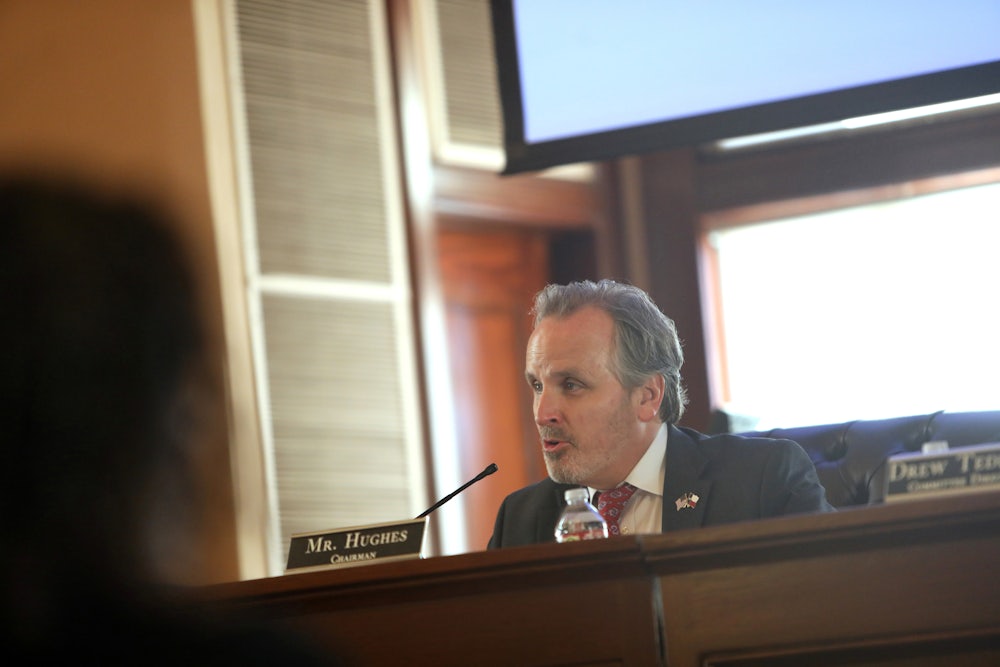“Canceled.” That’s how the website Ballotpedia phrases it. The “general election ... was canceled.”
Not just any election, but the 2022 general election of Texas State Senator Bryan Hughes. Hughes has an instinct for the controversial, championing bills banning critical race theory, suppressing votes, and regulating social media after Twitter banned Trump following January 6. Nationally, however, Hughes created the biggest stir by authoring Texas’s abortion ban—which infamously includes a private bounty encouraging everyday Texans to sue doctors for performing procedures that were legal at the time.
People from beyond Texas (and other red states) might be surprised to learn that the Hughes abortion law is deeply unpopular in Texas. Only 11 percent of Texans support an abortion ban with no exceptions, such as his. So you’d think pushing such toxic legislation would risk raising the wrath of the voters and getting Hughes booted from office.
But Hughes actually faced zero risk. After all, his election was “canceled.” Why? Because no one ran against him in 2022. Bryan Hughes ran unopposed.
So when extreme bills come up again in 2023, what do we think Senator Hughes will do? The answer’s pretty obvious. He will toe the same extremist line he always has—the same approach that rewards him with all the power of an “elected” position despite facing no election whatsoever.
I wish Hughes’s was an isolated case. But it’s not. In Mississippi, the author of the abortion ban that led to Dobbs itself also didn’t face a challenge in the 2019 election that followed that law’s passage. And the author of the Ohio six-week ban, no exceptions, also faced no opponent in 2022. Keep in mind, less than 10 percent of Ohioans support a ban with no exceptions. That was also the law that sparked national outrage when a 10-year-old rape victim had to travel to Indiana to get an abortion she couldn’t get in Ohio. Still, no opponent.
So, even as toxic abortion bans turned American politics upside down in 2022, the state-level authors of those bans returned to their offices without even opposition. Not a single mailer, or phone call, or knock on a door explained to constituents back in their districts what they had done.
But even these three were far from alone. In Ohio’s 2022 statehouse election, 17 incumbents with similar toxic voting records faced no opponents. How toxic? All had voted for a bill requiring on-demand genital inspections of girl and teen athletes—that’s how toxic. Yet 17 out of 99 ran unopposed! In 2020, that number was 20.
In Texas, 36 out of the 86 “winning” GOP statehouse candidates faced no general election opponent. In Tennessee, 37 of the 75 winning GOP candidates “won” without opposition. Florida, 34 out of 85. Add it all up, and even with all that was at stake in these states in 2022, millions of Americans had no choice when it came to who represented them in their statehouse. For those millions, democracy at the legislative level was indeed canceled.
But it gets even worse than that: These numbers only represent the seats where there was no opponent at all. When you add the even greater number of seats where challengers were so underfunded that they couldn’t undertake rudimentary tasks of a campaign, the numbers are far worse. In Ohio, for example, beyond the 20 unopposed incumbents in 2020, there were an additional 13 challengers who didn’t raise or spend $5,000 in their entire campaign. It turns out, Bryan Hugheses are everywhere!
But in a political world that focuses almost exclusively on federal outcomes and largely ignores state-level outcomes, that canceled democracy hardly raises a concern. It’s accepted as business as usual. And that turns out to be a terrible mistake.
Once you realize that we’re in a battle for democracy itself—and that the front lines of that battle are the very statehouse seats where politicians like Bryan Hughes are spending entire careers advancing extremism unchallenged—you realize that these numbers aren’t just bad. They amount to a crisis, inflicting enormous damage.
This article is an excerpt from Saving Democracy, published by St. Helena Press.










